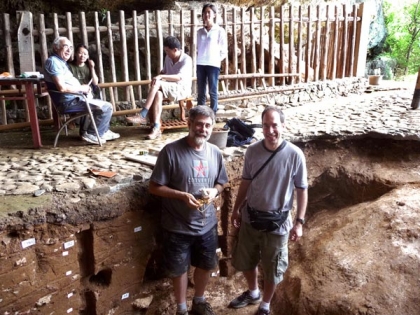Fieldwork at Xianrendong Cave, Jiangxi, China

Paul Goldberg and David Cohen (foreground) taking samples at Xianrendong Cave. Profs. Ofer Bar-Yosef, Wu Xiaohong, and Zhang Chi are behind, with visiting post-doc Hung Hsiao-chun.
BU Archaeology Department faculty members Paul Goldberg and David Cohen (ICEAACH), along with Prof. Ofer Bar-Yosef (Harvard) and Prof. Wu Xiaohong 吴小红 (Peking University), were invited to take micromorphology and radiocarbon samples from the Late Pleistocene limestone cave site of Xianrendong 仙人洞, located in Wannian 万年 County, Jiangxi Province, China. This research, in early August 2009, was part of the Early Rice Agriculture Project, whose on-going work in neighboring Hunan Province has included the excavations of Yuchanyan 玉蟾岩 Cave and the dating of its “world’s oldest” pottery to over 18,000 years ago (see description here).
Xianrendong Cave is well-known for its excavations during the 1990s, first in an early, international, collaborative project between Richard S. “Scotty” MacNeish, Peking University, and the Jiangxi Institute of Archaeology, and later by Peking University. The cave, along with nearby Diaotonghuan 吊桶环 rockshelter, yielded a long sequence that includes early pottery and evidence for the development of the early exploitation of rice.
Because of the complexity of the cave deposits and the need to more-securely date them, the “Early Rice” team was invited to take sediment samples and radiocarbon samples from re-opened excavation squares at the site. Micromorphological analysis by Paul Goldberg will give a clearer picture about how the deposits in the cave were formed — by both human activities and natural processes. By understanding this, we can also more reliably date the deposits with the new set of radiocarbon samples. Xianrendong potentially has pottery that is of similar age to Yuchanyan’s, and a long history of humans using the cave site over a 10,000 year period.
The fieldwork in August at Xianrendong was greatly aided by the warm support of the local officials. Said Dr. Cohen, “We received such wonderful support and assistance by the local officials from Wannian County. They were amazing hosts, seeing to all of our logistical needs, visiting us at the site, bringing us local foods for snacks while we worked, treating us to delicious banquets in the evening, and making sure that we were comfortable and happy, even in the 95-degree heat. We made many new friends, and we hope to be able to work at the site, and with them, again soon. Xianrendong is an important site in world archaeology and the issue of the origins of agriculture, and more work is needed there.”


